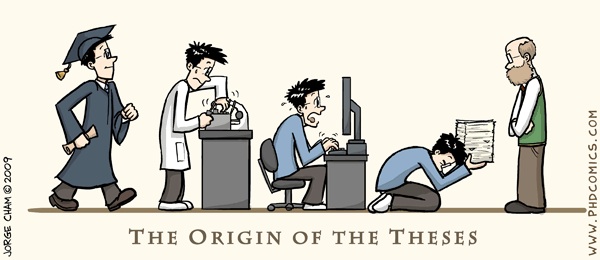You may have noticed a lack of a certain Ki Shah around these parts since her first post back in January, but there’s a good reason! If you thought the D-word was bad, try the P-word for size… A PhD is no joke. After years of work, Ki’s PhD is all handed in… but is the aftermath what she’d hoped?
Four years of work have come down to a couple of hundred pages: what do you do when you hand in your PhD thesis?
 “Piled Higher and Deeper” by Jorge Cham
“Piled Higher and Deeper” by Jorge Cham
http://www.phdcomics.com
Credited for keeping Ki Shah sane(r)
In my case, you get sick. I have been so ill this weekend that any prospect of celebrating handing in has gone completely out of the window. With my head in the toilet with my insides roaring up, shuddering and in tears, I considered that perhaps this was some kind of purge of PhD stress.
PhD, Doctor of Philosophy. In order to have one of these you need to be an expert in your chosen area, with demonstrable knowledge and a raft of research to back it up. You have to have contributed something substantive and novel to your field, undertaking work which has never been done before. This you may already know, but if you haven’t done one, perhaps you don’t realise that what it also means is frustration, self-doubt, repetitive work, social isolation, and sacrifice.
Having said that, I have known some people to seemingly coast through their studies. There are colleagues and friends of mine for whom the experience has been far less stressful than for most. These are the people who were publishing papers at the end of their first year, who had all their results/research finished in two years and spent a third year writing, redrafting and relaxing before submitting without the dramas I have seen others go through. These are the people who had jobs lined up before finishing and attended multiple conferences in exciting locations, already recognised as up-and-coming experts. What these people had in common were the following factors: a genuine passion for their field of study and the specifics of their project, a consistent relationship with their supervisor(s) providing timely feedback, the steady support of a partner who was not undertaking a similar project, and, possibly because of all the other factors, less of the crippling self-doubt that became my totem throughout my studies.
Make no mistake however, even those that seem to have it easy will experience the frustration, the days when you make no progress, the days when you end up right back at square one, the days when you can’t find any motivation. Likewise those of us who have struggled more than others will still experience the highs, getting published, giving a good presentation, making progress at all, and those rare times when your research seems applicable in the real world!
So how does it feel to hand in? Well, now that I’ve been able to keep food down for a whole day, I’d have to say I just feel a bit lost. The PhD study has been my entire identity, especially in the last few months of writing up, so it’s hard to be myself without it. Add to that my worries about whether or not I will pass my viva (the final exam for a PhD/MPhil thesis) and actually get the qualification, and my worries about finding a job, and it seems that handing in isn’t actually the relief I was hoping it would be. I’m hopeful, however, that as the sleepless nights and stress of the last week fade in my memory, I will be able to feel some pride and comfort in my achievements so far.
Got something to say? Go for it!